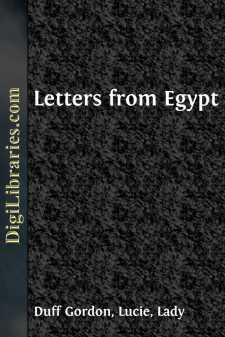Categories
- Antiques & Collectibles 13
- Architecture 36
- Art 48
- Bibles 22
- Biography & Autobiography 813
- Body, Mind & Spirit 142
- Business & Economics 28
- Children's Books 17
- Children's Fiction 14
- Computers 4
- Cooking 94
- Crafts & Hobbies 4
- Drama 346
- Education 46
- Family & Relationships 57
- Fiction 11829
- Games 19
- Gardening 17
- Health & Fitness 34
- History 1377
- House & Home 1
- Humor 147
- Juvenile Fiction 1873
- Juvenile Nonfiction 202
- Language Arts & Disciplines 88
- Law 16
- Literary Collections 686
- Literary Criticism 179
- Mathematics 13
- Medical 41
- Music 40
- Nature 179
- Non-Classifiable 1768
- Performing Arts 7
- Periodicals 1453
- Philosophy 64
- Photography 2
- Poetry 896
- Political Science 203
- Psychology 42
- Reference 154
- Religion 513
- Science 126
- Self-Help 84
- Social Science 81
- Sports & Recreation 34
- Study Aids 3
- Technology & Engineering 59
- Transportation 23
- Travel 463
- True Crime 29
Lucie Duff Gordon
Lucie Duff Gordon (1821–1869) was a British writer and translator known for her vivid travel writings and letters, especially about Egypt. Her most famous work, "Letters from Egypt," offers detailed insights into 19th-century Egyptian culture and society, and is praised for its empathy and cultural sensitivity. Lucie also translated German literature, including works by Theodor Mundt. Despite suffering from tuberculosis, which led her to move to Egypt for the climate, her letters remain some of the most important firsthand accounts of the region during that era.
Author's Books:
Sort by:
PREFACE In laying before the public this deeply affecting and romantic trial, which I have not without reason called on the title-page the most interesting of all trials for witchcraft ever known, I will first give some account of the history of the manuscript. At Coserow, in the Island of Usedom, my former cure, the same which was held by our worthy author some two hundred years ago, there existed...
more...
INTRODUCTION The letters of Lady Duff Gordon are an introduction to her in person. She wrote as she talked, and that is not always the note of private correspondence, the pen being such an official instrument. Readers growing familiar with her voice will soon have assurance that, addressing the public, she would not have blotted a passage or affected a tone for the applause of all Europe. Yet she...
more...



